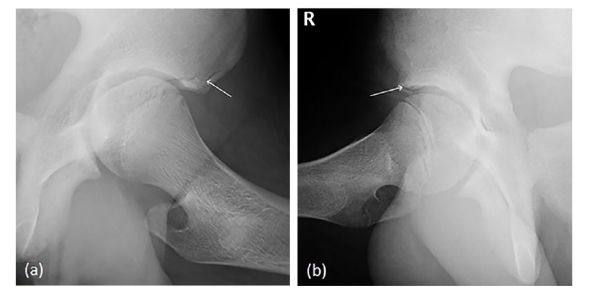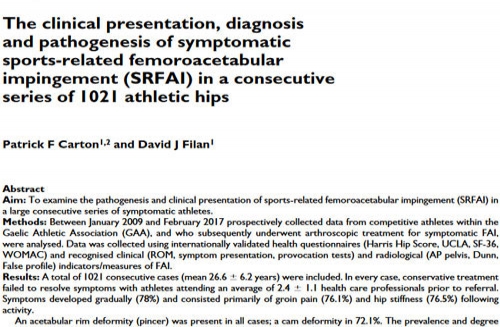The clinical presentation, diagnosis and pathogenesis of symptomatic sports-related femoroacetabular impingement (SRFAI) in a consecutive series of 1021 athletic hips

hipsPatrick F Carton1,2 and David J Filan1
HIP International
Aim
To examine the pathogenesis and clinical presentation of sports-related femoroacetabular impingement (SRFAI) in a large consecutive series of symptomatic athletes.
Methods
Between January 2009 and February 2017 prospectively collected data from competitive athletes within the Gaelic Athletic Association (GAA), and who subsequently underwent arthroscopic treatment for symptomatic FAI, were analysed. Data was collected using internationally validated health questionnaires (Harris Hip Score, UCLA, SF-36, WOMAC) and recognised clinical (ROM, symptom presentation, provocation tests) and radiological (AP pelvis, Dunn, False profile) indicators/measures of FAI.
Results
A total of 1021 consecutive cases (mean 26.6 ± 6.2 years) were included. In every case, conservative treatment failed to resolve symptoms with athletes attending an average of 2.4 ± 1.1 health care professionals prior to referral. Symptoms developed gradually (78%) and consisted primarily of groin pain (76.1%) and hip stiffness (76.5%) following activity.
An acetabular rim deformity (pincer) was present in all cases; a cam deformity in 72.1%. The prevalence and degree of cam deformity increased with progressing age groups (p < 0.001); mean lateral centre-edge angle remained static (p = 0.456). Increasing CEA, alpha angle and presence of rim fracture was associated with a reduction in all ranges of hip movement (p < 0.001).
Conclusion
Symptomatic SRFAI presented in this large series of GAA athletes failed to
resolve with non-operative treatment. Increasing hip deformity resulted in poorer ROM. Abnormal acetabular morphology remains static with increasing athletic age while cam deformity is progressive and most likely a secondary pathology.
Keywords
Diagnosis, FAI, hip arthroscopy, hip impingement, sports injury







